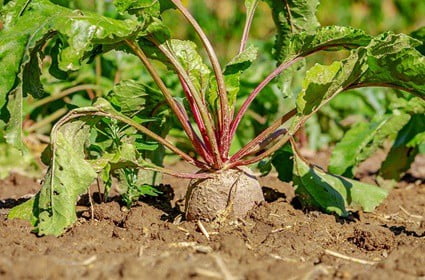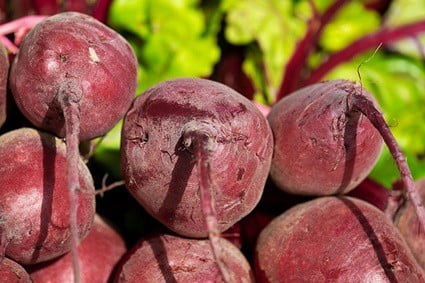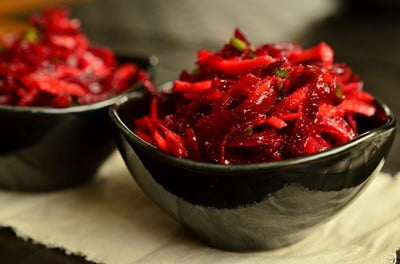Beetroot is a popular “superfood” filled with vitamins, fiber, and minerals. As an owner looking to boost your pet’s diet, you may wonder if this can be beneficial to your rabbit’s health. Unfortunately, root vegetables such as beetroot can sometimes be harmful to rabbits.
Rabbits can eat beetroot, but in small amounts. Since beetroot contains a lot of sugar, it can give your rabbit an energy boost. However, in excess, the sugar, calcium, and potassium found in beetroot can negatively affect a rabbit’s digestive system. Rabbits don’t eat beetroots in the wild, so their bodies aren’t designed to process it regularly.
To keep your rabbit from experiencing adverse effects, feed it small pieces of beetroot from your hand. Be sure to watch its stool and behavior for up to 48 hours afterwards. If your rabbit has runny stool or seems to act odd, then beetroot is not a good option. Providing your bunny with hay and water can help to return its digestive system back to normal.
Is it Safe for Rabbits to Eat Beetroot?
Beetroot is OK for rabbits to eat. This is because beetroot contains no toxic chemicals or elements that are immediately harmful to rabbits. However, the fiber and vitamins are only one part of a beetroot’s makeup.
The high sugar levels will be difficult for your rabbit to digest. According to a study by the Technical University of Madrid, beetroot should only be used as an energy concentrate to keep rabbits active.
Additionally, beetroot contains oxalic acid. This can be toxic for a rabbit. If allowed to build up in its system, through routine feedings, that can result in health problems. Beetroot is ‘safe’ for rabbits, but only in small amounts.
Can Rabbits Eat All Parts of Beetroot?
Beetroots offer a very distinct appearance. Each part of the root vegetable offers unique flavors and nutritional advantages.
A rabbit can eat all parts of a beetroot. However, certain parts should be fed more sparingly than others.

Can Rabbits Eat Beetroot Tops?
The “tops” or “bulbs” are the main component of a beetroot. The bulb is round in shape and purplish-pink in color. It often has a thick stalk jutting from the bottom.
This part of the beet contains high amounts of sugar and oxalic acid. Sugar is unhealthy for rabbits, but oxalic acid will be toxic in large amounts. This doesn’t mean it’s entirely off-limits to rabbits, however. You can cut the bulb into small bits and feed it in moderation to your bunny. Just be sure that, out of all a beetroot’s parts, this bulb is fed most sparingly.
Additionally, be aware that, after a rabbit eats them, its urine will turn pink. It’s nothing to worry about; it’s just the beets working through the digestive system.
Can You Feed Rabbits Beetroot Leaves?
The leaves of the beetroot are green with purple stems. These can also be eaten by rabbits, but once again, in very small quantities. This is because the leaves also contain oxalic acid, albeit in a lesser amount than the bulbs.
Beetroot leaves are a good source of vitamins and protein. In fact, they contain 17-18% protein according to The Rabbit: Husbandry, Health, and Production. However, the amount of potassium in beetroot leaves is too much for rabbits. If ingested in large amounts, it can result in digestive problems.
Can You Feed Rabbits Beetroot Stalks?
The stalks of the beetroot are long and bright fuchsia in color. Unfortunately, just like the bulb and the leaves, they can only be eaten in small amounts.
The stalks have the least amount of oxalic acid, but a high degree of sugar. As such, if you’re going to feed your rabbit beetroot, this is the safest portion for it to ingest. Just be sure it’s rationed, so that the sugar doesn’t add up.
Nutritional Value of Beetroots
As a treat or occasional health-boost, beetroots can offer these nutritional elements to your rabbit per 100 grams:
| Carbohydrates | 9.56 g |
| Sugar | 6.76 g |
| Dietary Fiber | 2.8 g |
| Fat | 0.17 g |
| Protein | 1.61 g |
| Calcium | 16 mg |
| Iron | 0.8 mg |
| Potassium | 325 mg |
| Sodium | 78 mg |
| Zinc | 0.35 mg |
Is Beetroot Good For Rabbits?
Outside of technical nutrition, beetroot can help your rabbit’s day-to-day life. In moderation, it can enhance your rabbit’s diet through:
An Energy Boost
Beetroot is rich in sugar, pectins, and fiber. The sugar content can boost your rabbit’s energy levels. Likewise, the pectins and fiber can help it better process that energy.
If your rabbit feels lethargic, a small helping of beetroot can assist. However, this should only be a teaspoon’s worth of beetroot. The sugar can be harmful in larger amounts.
Protein from The Leaves
As mentioned, beetroot leaves contain a high amount of protein. This can help with your rabbit’s growth, especially in young rabbits. It’ll also boost the bunny’s energy levels, and the functioning of its body and mind.
However, not all rabbits need the same amount of protein. This will depend on their activity levels. If they’re outside rabbits, they’ll need more to compensate for their level of movement. If they’re indoor rabbits, they’re likely more sedentary and won’t need as much protein.
If your rabbit has been running and playing non-stop, a few beetroot leaves can help it recoup its energy. However, don’t be tempted to feed your bunny until it’s full. The oxalic acid levels can stack up and reverse the advantages.
Is Beetroot Bad for Rabbits?
Even with these advantages, rabbits can suffer from too much beetroot. This is because of the:
Oxalic Acid
Oxalic acid can build up in your rabbit’s body. This can result in behavior changes. Likewise, its stool may turn runny and soft. Diarrhea and other digestive issues are the most common symptom when it comes to overfeeding rabbits beetroot.
Sugar
Too much sugar can change the gut flora of rabbits’ intestines. This, in turn, will affect how they break up and digest their food. In excess, sugar will cause weight gain, lethargy, and digestive issues, including diarrhea and upset stomach.
Potassium
Beetroot leaves are very rich in minerals, especially potassium. In excess, potassium can cause digestive issues. However, the worst symptoms of potassium overdose in rabbits are far more concerning. These include lethargy, muscle weakness, and even death if left untreated.
Low Fiber Content
According to the Journal of Animal Science, rabbits need a diet that is high in fiber. At least 20-25% fiber is necessary for a fully grown rabbit. This ensures its food can be quickly and easily digested.
If your rabbit experiences stomach or stool issues, chances are, that’s because it isn’t getting enough fiber in its diet. Most times, this can be remedied with high-fiber pellets or greens that are fiber-rich. Even if the oxalic acid wasn’t an issue, beetroot does not have enough fiber for a rabbit’s gastrointestinal system to run properly.
Too Much Calcium
Rabbits need calcium to keep their bones strong and healthy. However, rabbits have a different way of metabolizing calcium than other animals. They don’t need vitamin D to absorb calcium.
If they consume too much calcium, it exits through the urine. It will need to work through the kidneys before it can be separated and excreted. If rabbits need to expel a large amount of calcium, this can result in kidney damage.
Has My Rabbit Eaten Too Much Beetroot?
When introducing beetroot to your rabbit’s diet, finding the right balance can be tricky. Be sure to look for these signs of a rabbit consuming too much beetroot:
Behavior
The imbalance of a rabbit’s digestive system will often manifest as aggression or lethargy. Watch out if your rabbit appears to isolate itself, refuses to play, or has no energy for play. This can indicate many health issues. However, if it comes shortly after eating beetroot, you have a likely culprit.
Likewise, you may find your rabbit nipping at you, intimidating your other rabbits, or displaying defensive body language. This aggression is its way of protecting itself when it feels unwell.
Digestion
Rabbits have unique digestive systems, which allow them to process the nutrients from their food several times over. When kept in balance, this is a very effective system. However, it means rabbits don’t handle sudden changes to their diet well. You may notice your rabbit’s stool growing runny or escalating to full-on diarrhea.
Your rabbits’ cecotropes may lack consistency or produce an offensive odor. This can indicate that your rabbit has a bacterial imbalance. Eliminating beetroots from its diet and introducing more hay or grass can help return it to normal. You can also speak with your vet if symptoms don’t clear up within 48 hours.
How Much Beetroot Should Rabbits Eat?
There is no concrete number for how much beetroot a rabbit should eat. It will vary from rabbit breed to rabbit breed, according to their weight and unique digestive system. One rabbit may safely enjoy a larger amount, while a rabbit of comparable size might have a bad reaction. Begin feeding your rabbit a small amount and then observe its reaction. Here’s how:
- A teaspoon of beetroot is a safe benchmark.
- After that, wait 48 hours.
- During this time, watch for changes in its behavior, bowel habits, and for any signs of discomfort.
- If it shows negative symptoms, then provide it with hay or grass, as well as water. This will allow your rabbit to safely ‘flush’ the beetroot from its system.
- If your rabbit appears to show no ill effects, you can carefully increase the amount. Add one more teaspoon and wait another 48 hours.
Even if your rabbit shows no negative effects, you should always use beetroot as a treat. It should not be a substitute for your rabbit’s normal diet. If you feel the amount is turning into a meal, then reduce the amount of beetroot fed to your rabbit.
Do Rabbits Eat Beetroot in the Wild?
Rabbits do not eat beetroot in the wild because this root vegetable is often difficult to find. Likewise, bunnies would have to dig them up, since they grow underground. Rabbits are far more likely to be attracted to weeds, grass, clover, flowers, and above-ground vegetables.
In the winter, when those foods aren’t available, they look for twigs, needles from trees, and anything green that is still growing in the cold weather. Beetroots never factor into this foraging process.
Domesticated rabbits may accept a wider range of food from their owners. Nonetheless, they typically like and are able to digest the same things.

Should You Cook Beets for Your Rabbit?
When feeding your rabbit beetroot, it should be raw. Cooked beets produce too much starch. Likewise, most of their fiber and minerals are stripped in the cooking process. Because rabbits need a high degree of fiber in their diet, this can leave your bunny to eat ‘empty’ food.
However, it’s not smart to pull a beet out of the yard or supermarket and offer it to your bunny straight. Instead, wash the beetroot thoroughly and scrub away any dirt. There’s no need to peel the vegetable, as the skin contains most of the vitamins your rabbit will benefit from.
From there, you can slice them into small pieces, so you can regulate how much your rabbit eats.
Your rabbit may enjoy the taste and health advantages of beetroot. However, it can damage its physical and behavioral health if it consumes too much. Because of this, you should save beetroot for an occasional treat – and only in small portions.
A teaspoon or two can provide your bunny with the energy, protein, and vitamin boost it needs. By keeping it in moderation, your rabbit can also avoid the negative effects of too much sugar, potassium, oxalic acid, and calcium.

